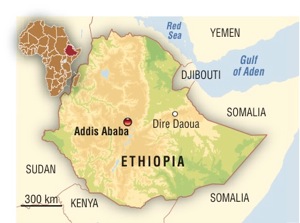Ethiopia sells swathes of land to foreigners
Ethiopia has allocated 5 130 hectares of land to foreign investors interested in industrial zones and aims to generate over $500 million in revenue. 776 hectares of land in Hawassa is to be sold.
The industrial zones are located in various parts of the Horn of Africa country including Dire Dawa city, Amhara, Southern and Somali regional states.
Chinese and Turkish investors have shown interest in establishing industrial zones in the country by investing over $1 billion.
About 700 hectares of the land is in the Borena area of Dire Dawa while 350 hectares is located in Shinele area of the Somali regional state.
Another 1 123 hectares is targeted for industrial use in Kombolcha city in the Amhara regional state while Hawassa was allocated 776 hectares, Addis Ababa (436 hectares) and Bole Lemi and Akaki Kality with 243 respectively.
The Ethiopian government expects to raise more than $ 500 million from the development projects and create 10 000 jobs.
Investors are interested in horticulture, textile, leather and other industries.
"The industrial sites were designated with the aim to reduce costs associated with investment and aid plans to enhance technological expertise, exports and increase foreign currency revenue," the Ministry of Industry said.
"Industrial development will create significant employment opportunities and aid agricultural development as well as providing social services."
According to the ministry, an industrial zone established in the Oromia state about 40 kilometers east of Addis Ababa, has attracted a $ 250 million investment from China alone.
The 200 hectare industrial zone will support 81 industrial ventures including Hujian an internationally recognised footwear company.
Government is pushing for the establishment of other factories in various regional cities and towns across the country over the current fiscal year.
China and India have invested more than $ 6 billion in various development projects in Ethiopia in recent years.
Experts say the recent lease of land to investors has been attractive in the country's search for ways to boost its agricultural production whilst creating jobs, especially in the current state of the world economy.
Actual returns on investments in the agricultural sector, they argue, may be lower than expected.
"inhibited" or "underutilised"
To date, the country's Agricultural Investment Support Directorate (AISD), established in 2009 under the Ministry of Agriculture and Rural Development to identify potential agricultural investment areas, has delineated over 3 million hectares of Ethiopiars 47 million hectares arable land towards the land lease programme.
The total area of the Horn of Africa country is about 123 million hectares.
Critics have warned that not only does land lease pose a potential risk of loss of land for local farmers, but also much of the land being leased out is not as unused as it might seem.
And whilst land in Ethiopia, according to the constitution, belongs to the people, it can only be administered by the state.
Last month Human Rights Watch, a US based advocacy group, accused the Ethiopian government of forcibly relocating people to new areas that lacked adequate food, farmland and facilities.
The government, which promised that assistance would be provided for the affected people, refuted the report saying that the moves were voluntary.
The report said that the government was bypassing constitutional provisions by claiming that the delineated lands were either "inhibited" or "underutilised"





Comments
Post a Comment